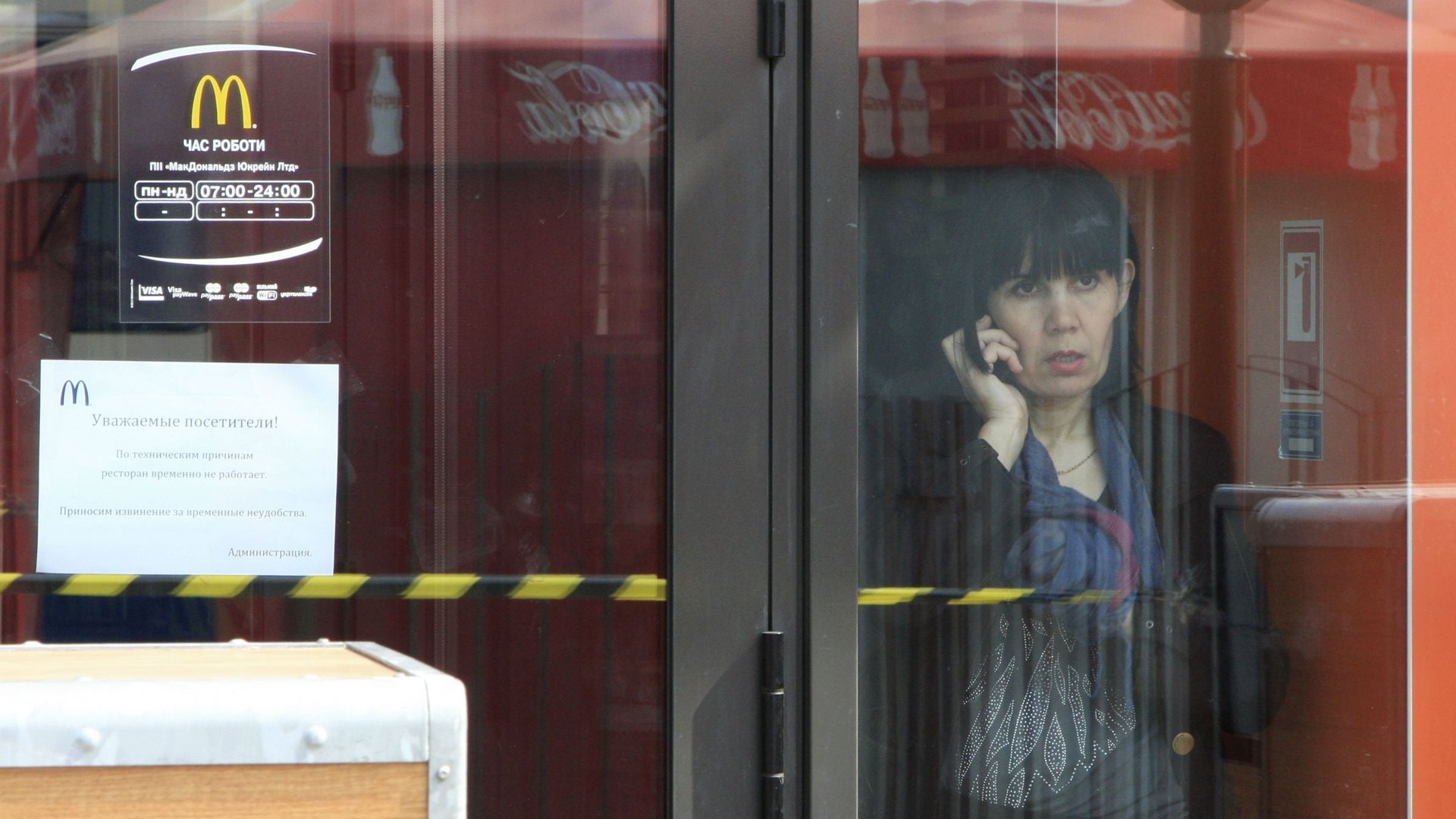Crimeans lose their access to methadone and McDonald’s
As Western leaders continue attempts to cajole and threaten Russia away from Crimea, the Kremlin is beginning to flex its muscle in the region-starting with shuttering methadone clinics that help rehabilitate heroin addicts, and likely prompting the decision by McDonald’s to temporarily close its Crimea locations. According to the Associated Press, local doctors promised the 800 patients who visit the clinics that the program, in place for five years, would be extended at least throughout 2014. But Russia’s Federal Drug Control Service chief Viktor Ivanov issued a harsh statement against the program, which is illegal in Russia, saying it will be shut down without offering concessions to its users. Ivanov, quoted in Russian news agency ITAR-TASS, maligned the program, saying:


As Western leaders continue attempts to cajole and threaten Russia away from Crimea, the Kremlin is beginning to flex its muscle in the region-starting with shuttering methadone clinics that help rehabilitate heroin addicts, and likely prompting the decision by McDonald’s to temporarily close its Crimea locations. According to the Associated Press, local doctors promised the 800 patients who visit the clinics that the program, in place for five years, would be extended at least throughout 2014. But Russia’s Federal Drug Control Service chief Viktor Ivanov issued a harsh statement against the program, which is illegal in Russia, saying it will be shut down without offering concessions to its users. Ivanov, quoted in Russian news agency ITAR-TASS, maligned the program, saying:
Methadone is not a cure. Practically all methadone supplies in Ukraine were circulating on the secondary market and distributed as a narcotic drug in the absence of proper control. As a result, it spread to the shadow market and traded there at much higher prices. It became a source of criminal incomes.
Andriy Klepikov, the executive director of the International HIV/AIDS Alliance in Ukraine, discussed the urgency of the situation in a blog post on The Huffington Post, saying that they could be without the drug in a few short weeks: In Sevastopol substitution therapy sites have already been compelled to start decreasing patients’ dosage. There is a very strong likelihood that these opioid substitution therapy patients will go into withdrawal and potentially revert to illegal drugs, which in turn puts them at much greater risk of contracting HIV through dirty needle Ukrainian officials say they will not continue to send methadone to Crimea, and recommend that those seeking treatment move to the mainland. The methadone clinics have been used to help stop the spread of HIV in Crimea, and their ban could mean a reversal of any steps taken towards containing the disease. The AP reports:
The ban could undermine years of efforts to reduce the spread of AIDS in Crimea; some 12,000 of the region’s 2 million people are HIV-positive, a 2012 UNICEF survey found. After years of rapid growth in the infection rate, the Ukrainian Health Ministry reported the first decline in 2012. Many have attributed that decline to methadone therapy. According to the International HIV/AIDS Alliance of Ukraine… drug injectors accounted for 62 percent of new HIV infections in Ukraine in 2002. By 2013, that number was down to 33 percent.
If anything, Russia could benefit from some methadone clinics of its own. HIV is spreading quickly in the country: Russian Federal AIDS Center said the number of registered HIV patients spiked by 11 percent in 2013. Some Crimeans will also have to wean themselves off a (not serious) addiction as McDonald’s plans to close down its locations in the region, for now. According to the company, “due to operational reasons beyond our control, McDonald’s has taken the decision to temporarily close our three restaurants in Simferopol, Sevastopol and Yalta.” Reuters reports that employees at these locations can relocate to branches in Ukraine, for the same pay and three months rent. The company added, “We understand and respect each employee’s decision. If they do not wish to move to another city in Ukraine we will, in accordance with Ukrainian law, offer options to end their employment with a redundancy payment.” McDonald’s European headquarters said the plan is to “re-open our restaurants as soon as possible.” As far as we can tell, that makes two excellent reasons for Crimea to defect from Russia and return to Ukraine.
This post originally appeared in The Wire. More from our sister site:
The things to consider when looking for new Medicaid enrollment numbers